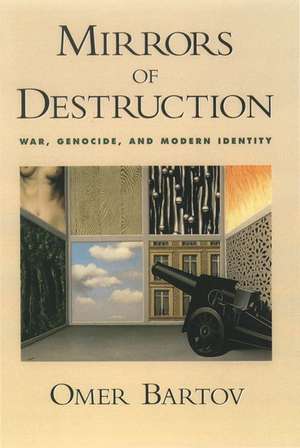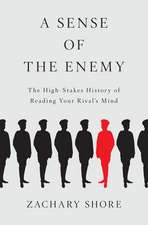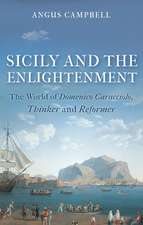Mirrors of Destruction: War, Genocide, and Modern Identity
Autor Omer Bartoven Limba Engleză Paperback – 28 feb 2002
| Toate formatele și edițiile | Preț | Express |
|---|---|---|
| Paperback (1) | 230.04 lei 31-37 zile | |
| Oxford University Press – 28 feb 2002 | 230.04 lei 31-37 zile | |
| Hardback (1) | 847.42 lei 31-37 zile | |
| Oxford University Press – 21 sep 2000 | 847.42 lei 31-37 zile |
Preț: 230.04 lei
Nou
Puncte Express: 345
Preț estimativ în valută:
44.02€ • 45.79$ • 36.34£
44.02€ • 45.79$ • 36.34£
Carte tipărită la comandă
Livrare economică 03-09 aprilie
Preluare comenzi: 021 569.72.76
Specificații
ISBN-13: 9780195151848
ISBN-10: 0195151844
Pagini: 320
Ilustrații: 17 halftones
Dimensiuni: 232 x 154 x 17 mm
Greutate: 0.44 kg
Ediția:Revised
Editura: Oxford University Press
Colecția OUP USA
Locul publicării:New York, United States
ISBN-10: 0195151844
Pagini: 320
Ilustrații: 17 halftones
Dimensiuni: 232 x 154 x 17 mm
Greutate: 0.44 kg
Ediția:Revised
Editura: Oxford University Press
Colecția OUP USA
Locul publicării:New York, United States
Recenzii
His insights about the Great War, the Holocaust, and public memory makes Mirrors of Destruction an important contribution to the literature.
What does it mean to "come to terms with the Holocaust?" ... Bartov brings a prodigious amount of reading, intelligence, and critical energy to [this question] ... To his credit, [he] rejects the mystifications that one often finds in writing on the Holocaust--for instance, the notion that it is fundamentally inexplicable, or that only survivors can grasp its deeper significance ... In his conclusion [he] explores new material, taking on new polemics and problems and offering a brilliant analysis of the strange case of Binjamin Wilkomirski, a Swiss writer who falsely claimed to be a Holocaust survivor in his memoir `Fragments.
Bartov's work has always been characterized by its thoughtfulness and independence, and here he combines archival research with an interdisciplinary critique of the literature drawn from widely diverse fields. He focuses on the links of social, cultural, and military history and offers particularly interesting insights into Europe's two major wars in this century and their relationship to the Holocaust. This is history painted in large strokes, and anyone trying to understand how and why the promise of the twentieth century went horribly wrong should read this book.
What does it mean to "come to terms with the Holocaust?" ... Bartov brings a prodigious amount of reading, intelligence, and critical energy to [this question] ... To his credit, [he] rejects the mystifications that one often finds in writing on the Holocaust--for instance, the notion that it is fundamentally inexplicable, or that only survivors can grasp its deeper significance ... In his conclusion [he] explores new material, taking on new polemics and problems and offering a brilliant analysis of the strange case of Binjamin Wilkomirski, a Swiss writer who falsely claimed to be a Holocaust survivor in his memoir `Fragments.
Bartov's work has always been characterized by its thoughtfulness and independence, and here he combines archival research with an interdisciplinary critique of the literature drawn from widely diverse fields. He focuses on the links of social, cultural, and military history and offers particularly interesting insights into Europe's two major wars in this century and their relationship to the Holocaust. This is history painted in large strokes, and anyone trying to understand how and why the promise of the twentieth century went horribly wrong should read this book.
Notă biografică
Omer Bartov is John P. Birkelund Distinguished Professor of European History and Professor of History at Brown University and has written on the Holocaust, Nazi Germany, and modern France. His books include Murder in Our Midst: The Holocaust, Industrial Killing, and Representation; Hitler's Army: Soldiers, Nazis, and War in the Third Reich; and The Eastern Front, 1941-45: German Troops and the Barbarisation of Warfare.












